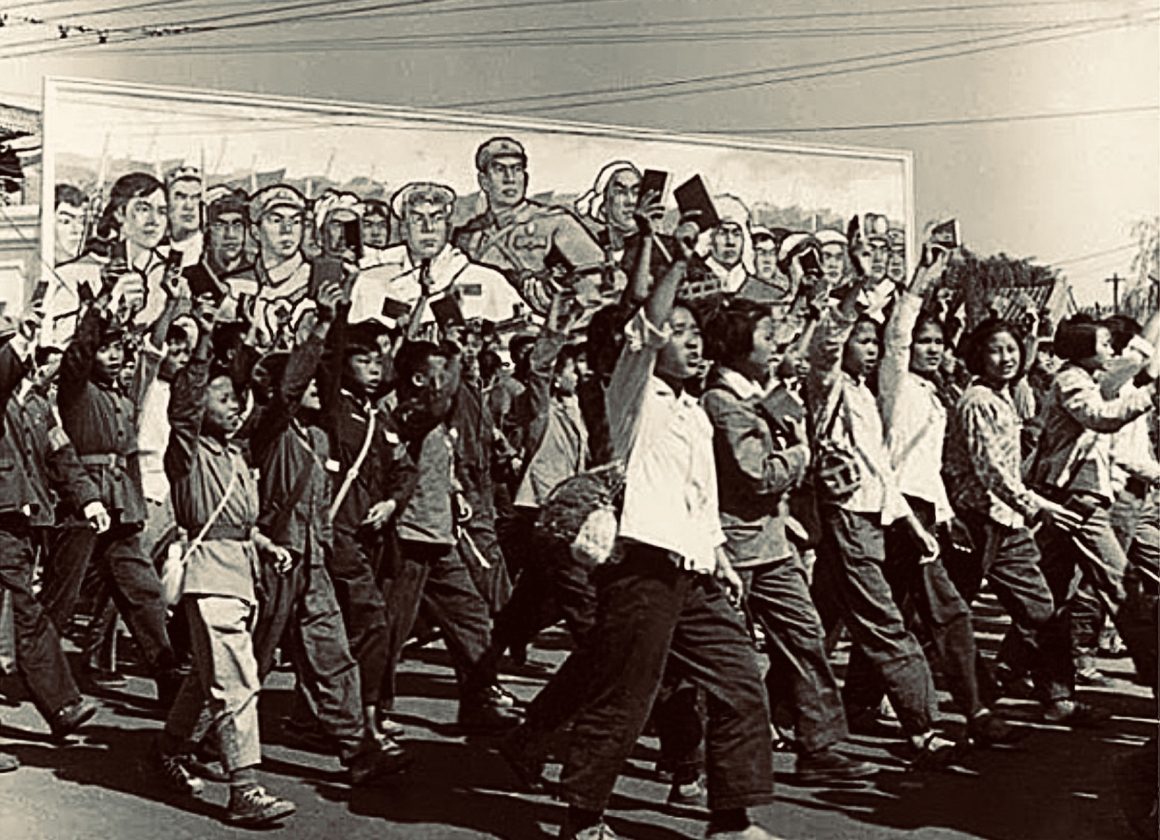There’s a difference between trying to please every individual, and uniting the masses. If you accommodate each ideological faction that you encounter as a revolutionary, believing this is what you need to do to build a popular coalition, you’ll end up achieving the opposite and alienating yourself from the masses. Because in a society defined by capitalism, imperialism, and colonialism, there are plenty of people with reactionary ideas. And reactionary ideas are opposed to the interests of the masses.
We can’t enable colonialism
An example of this error, the error of mistaking appeasement of reactionaries for building mass unity, is found in the Center for Political Innovation. Its adjacent polemicists, such as the supposedly Marxist streamer Infrared, argue that communists shouldn’t advocate for the abolition of the United States because the masses supposedly will be alienated from communism should we take this position. But by “the masses,” these types are truly referring to specific elements among the masses, ones that the CPI places excessive importance upon despite these elements actually representing some of the least revolutionary parts of the population. These elements are the labor aristocrats, the petty bourgeoisie, the settlers who own land. These represent a small minority of the masses, not the vast majority of proletarians—including white proletarians—who don’t own any land and therefore wouldn’t lose anything if the land were transferred over to the oppressed nations.
These parts of the frustrated middle class are more likely to be won over towards fascism than towards communism. And if the “patriotic socialists” believe preventing them from becoming fascists is instrumental for the revolution, they’ve overlooked the elements of the masses that are far easier to bring towards communism. The elements that, due to their extreme subjugation by the United States, are more likely to be repulsed by the American flag than attracted by it.
In contrast to the middle class, the elements of the masses that stand the most to gain from an end to settler-colonial land relations are the elements that have the most revolutionary potential. These are the Black, Brown, and Indigenous proletarians, the colonized lumpenproletarians who’ve been pushed to society’s margins by capitalism, the millions of felons among the lempen who live without civil rights. They aren’t tethered to the settler-colonial order, and they would have everything to gain from the restoration of pre-colonial territorial control for the tribes, the establishment of an autonomous Chicano state, and the establishment of the Republic of New Afrika.
For this reason, there’s sociological evidence that these impoverished and disenfranchised nonwhites will be the first ones to physically rebel against the state as America’s conditions continue to worsen. In an analysis on why the colonized lumen are the most likely to participate in an insurrection against the state, sociologist Temitope Oriola has written:
Transgenerational oppression of an identifiable group is one of the pre-conditions for an armed insurgency, but this is hardly news. What the U.S. has managed to institute on a national and comprehensive scale is what sociologist Jock Young calls “cultural inclusion and structural exclusion.” A strong sense of injustice, along with significant moments, events and episodes — like the killings of Taylor and Floyd — are also important….There is another, related variable: The availability of people willing and able to participate in such insurgency. The U.S. has potential candidates in abundance. Criminal records — sometimes for relatively minor offences — that mar Black males for life, have taken care of this critical supply. One study estimates that while eight per cent of the U.S. general population has felony convictions, the figure is 33 per cent among African American males. Some of these men may gradually be reaching the point where they believe they have nothing to lose. Some will join for revenge, others for the thrill of it and many for the dignity of the people they feel have been trampled on for too long.
When this revolt begins, the colonized peoples, who will act as its vanguard, will be joined by the progressive elements of the white proletariat and lumpenproletariat. The reactionary minority that the CPI seeks to appease will be fighting against these revolutionaries, or apathetically complaining from the sidelines. These flaws in the CPI’s analysis are an example of a right deviation, coming from that false assumption about how accommodating reactionary ideas is synonymous with constructing a popular coalition. A left-wing example of this error is the idea that gangs are tools for revolution.
We can’t enable gang ideology
Because gangs are a response to capitalism and colonialism, a bid for self-determination from the oppressed nations that can’t find autonomy from looking to any institutions besides gangs, ultra-leftists assume that gangs can be turned into revolutionary vehicles. But the fundamental character of gangs makes them incompatible with the goals of a vanguard party. They’re military governments that seek to gain access to capitalism’s underground markets, which means that they won’t cede control to a workers state, and that they won’t want the exploitation within these markets to end. The class interests of the lumpenbourgeoisie who run the gangs are in conflict with the interests of the proletariat. The lumpenbourgeoisie don’t want the lumpen to become proletarianized, as in be provided with jobs and alternative social outlets to gangs. They want the lumpen to remain in their desperate position, and therefore able to continue serving the power structure of the gangs.
This reality about the counterrevolutionary class character of the gangs bleeds into gang ideology, which tends to encourage ultra-leftist sentiment rather than scientific socialism. This tendency exists because gang ideology and scientific socialism are incompatible. The former is based around idealistic thinking, instead of materialist analysis. It centers on a concept of “loyalty” that demands uncritical allegiance to the clique, whether this clique is the gang itself or the political cults that ultra-leftism tends to produce. Such a mentality is hostile towards criticism and intellectualism, and provides an ideological rationale for counterrevolutionary actions like adventurism, individualism, and other manifestations of liberalism.
Part of this stubbornness can come from the fact that gang members are more likely to listen to criticism from people within their own community than from outsiders; capitalism and colonialism’s harrowing conditions have made gangs become insulated out of necessity, and this can be hard for outsiders to understand. So gang members can reflect, leave their gangs, and give up any toxic habits they’ve internalized, as some former gangsters I’ve encountered have done. But no one can force these kinds of changes, and if someone from this category turns out to be an active abuser (as I’ve also seen), we shouldn’t enable them out of the hope that they’ll change.
If these reactionary and destructive tendencies influence the movement, the movement won’t be able to gain mass support. It will remain isolated to whatever enclaves it can manage to carve out, running in endless circles of guerrilla struggle, like the Maoist struggles in India and the Philippines. Unsurprisingly, Maoism is also ideologically informed by ultra-leftism, with its unwillingness to bend to material realities which contradict the political cult’s predetermined ideals. When Maoists denounce China for implementing the market reforms necessary to make its productive forces adequate, they’re coming from the same place as the gang fetishists I’ve encountered who denounce communist parties for not accommodating their recklessly violent way of operating. What’s important to the ultra-leftist is not what the conditions call for, but what their ideals claim is right.
For communists to build unity with the lumpen, and to therefore unite with a crucial portion of the revolutionary population in this country, we must recognize that such a thing as gang ideology exists. And that gang ideology can’t be accommodated by Marxists, but made obsolete. To do this, we must not allow the reactionary elements among the lumpen to influence our movement, any more than we should allow the reactionary labor aristocrats to influence our stances. This means not letting active or semi-active gang members into communist parties; they’re a tiny minority of the lumpen, and the majority of the lumpen are women who’ve been economically pressured into doing tasks like sex work. This also means not romanticizing the existence of the lumpen, or overlooking the fact that the proletariat has the unique ability to wield leverage over the economy.
What we must do is build alternative social and material outlets to the gangs, like the Panthers did with their mutual aid networks and armed anti-racist community patrols. What will also be essential for us to provide are tenants’ unions, and revolutionary education outlets. After we’ve gained power, we’ll also be able to provide a jobs program that isn’t constrained by capitalism’s demand for a reserve army of labor, and therefore can employ everyone who’s able to work.
When we’ve delivered these improvements in conditions for the lumpen, gangsterism and its ideology will be made obsolete. The colonized peoples will no longer have a material incentive to join the gangs en masse, and the lumpenbourgeoisie will be able to get suppressed like it is under China’s communist party. But communists can’t get that kind of power until we’ve gotten the masses on our side. Which does not mean appeasing the reactionary elements of the masses, whether middle class or lumpen. It means acting according to the interests of the masses. Because if we do what’s in the interests of the masses, enough of the masses will support us for us to be able to defeat the capitalist state.
When it comes to the lumpen question, we can’t approach this task idealistically. We can’t assume we can win over every member of that class, because though the lumpen have great revolutionary potential due to their growing numbers, they’re simultaneously vulnerable to reactionary influence.
This is where we must take into consideration Oriola’s prediction about some of the lumpen seeking to join the revolution “for the thrill of it.” If someone is trying to carry out personally cathartic violence while acting on behalf of our organizations, they may not be willing to follow the discipline required by democratic centralism, and could hurt the party through alienating acts of violence. Should we encounter these cases of individuals with ulterior motives that aren’t aligned with the revolution’s goals, we must not be afraid to hold them accountable, and purge them should they fail to correct their errors. Which is where revolutionary principles are required. We can’t let our emotional biases prevent us from enforcing integrity in our cadres, or let bad actors use identity politics, past traumas, or other potential excuses as rationales for harming the interests of the masses.
Building unity with the lumpen will require not trying to appease all of the elements among the lumpen, but acting in the interests of the masses. In other words, the equivalent of the approach we must employ towards the masses as a whole.
We must act with the masses as our guide
When I say that if we act in the interests of the masses, the masses will unify with us, I don’t mean the masses will automatically follow us after we’ve laid down decrees. The relationship between the revolutionaries and the masses is not one of paternalistic commandism, because the masses are the ones we’re working on behalf of. To work on behalf of them instead of acting like we’re they’re masters, we must not compromise our principles, while at the same time not being obtuse for those outside the studied circles of Marxism. The way to do this is through the mass line, a Maoist idea that the Maoists are right to practice despite them being incorrect on other things. Scott Harrison from Massline.info describes it in this way:
The mass line is the primary method of revolutionary leadership of the masses, which is employed by the most conscious and best organized section of the masses, the proletarian party. It is a reiterative method, applied over and over again, which step by step advances the interests of the masses, and in particular their central interest within bourgeois society, namely, advancing towards proletarian revolution. Each iteration may be viewed as a three step process: 1) gathering the diverse ideas of the masses; 2) processing or concentrating these ideas from the perspective of revolutionary Marxism, in light of the long-term, ultimate interests of the masses (which the masses themselves may sometimes only dimly perceive), and in light of a scientific analysis of the objective situation; and 3) returning these concentrated ideas to the masses in the form of a political line which will actually advance the mass struggle toward revolution. Because the mass line starts with the diverse ideas of the masses, and returns the concentrated ideas to the masses, it is also known as the method of “from the masses, to the masses”. Though implicit in Marxism from the beginning, the mass line was raised to the level of conscious theory primarily by Mao Zedong.
This approach is applicable to what I’ve said about how accommodating the reactionary ideas among the masses will actually undermine our attempts to unite with the masses. Because the mass line doesn’t demand that we accept or entertain every backwards sentiment that we encounter from individuals; if we encounter a proletarian who likes to display the U.S. flag, we shouldn’t tell him he’s right to do this, as the CPI would claim. Nor should we attack him and everyone like him as fascists, because many who wave the U.S. flag aren’t fascists. Only ignorant. We should open up a dialogue on this continent’s colonization, and put forth the Marxist analysis on why that flag exists. This analysis being that the United States was created to extract wealth from the Indigenous lands, and from the labor of primarily colonized peoples. If the flag-waver is white, we can remind them that the white proletariat and lumpenproletariat are also exploited under the capitalist system that the settler state has brought to this continent. As well as that one has an obligation to support reparations for colonialism, no matter what color one is.
Will these arguments trigger the sensibilities of reactionaries? Of course, but we shouldn’t care what reactionaries think. If someone reacts to a nuanced and respectful case for class solidarity with angry vitriol, they’ve already chosen their side in this conflict. And like I said, these middle class MAGA types aren’t the group that has the most revolutionary potential. The groups most likely to become this continent’s revolutionary vanguard, to learn the theory, to volunteer for being part of the revolutionary fighting force, are the groups that have been subjugated the most by capitalism and colonialism. They’re the parts of the masses which can manifest the changes required for improving the conditions of the masses as a whole.
Mobilizing these parts of the masses does not require bending to the will of every ultraviolent, ideologically backwards, or otherwise flawed individual who we encounter among the lumpen. That will only make us unable to win over the masses. What it does require is the mass line’s approach towards the masses: finding out what the masses desire, formulating an analysis on these desires from a Marxist perspective, and articulating this analysis to the masses in a way which assures them that we’ll improve their conditions. And if this makes any reactionaries unhappy, we should pay no mind to them, other than when it becomes necessary to defend from the violence that they’ll try to inflict upon us. The reactionaries are not our friends but our enemies, because they’re enemies of the masses.—————————————————————————
If you appreciate my work, I hope you become a one-time or regular donor to my Patreon account. Like most of us, I’m feeling the economic pinch during late-stage capitalism, and I need money to keep fighting for a new system that works for all of us. Go to my Patreon here.








